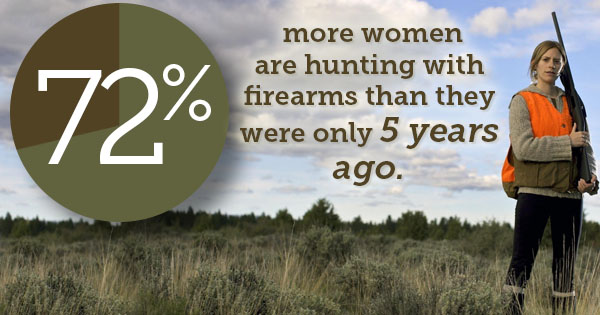There are a lot of misconceptions about the hunting and fishing community. And the truth is that unless you are a member of these groups, there’s a good chance you’ve already bought into some false stereotypes about these classic American pastimes.
To learn more, check out these three facts about the sport of hunting and the people who participate in it:

- More women are becoming hunters: There was a time where hunting and fishing was a predominantly male-centered sport — and in many ways, especially by reputation, it still is. But the ladies are quickly catching up. According to new research, 72% more women are hunting with firearms today than were just five years ago, and 50% more women are now target shooting as well. As we break down gender norms across all fields, women feel more and more comfortable exploring previously tabooed hobbies.
- Sportsmen are environmentalists: For the past 80 plus years, sportsmen have paid more than $13.7 billion for various on the ground projects in every state to protect our natural environment. Indeed, by 2012, hunters and target shooters have paid a grand total of more than $7.2 billion in excise taxes through the Federal Aid in Wildlife Restoration Act. There is no doubt that hunters and anglers alike know the value of the environment, and it’s in the best interest for them (and everyone) to support its preservation. In many states, hunting is also highly regulated for this exact reason. To succeed in the sport, hunters must learn to understand the rules of the wild that allow the precarious balance between hunters and game animals to continue.
- Hunting supports the economy: Hunters and anglers together support more than 680,000 U.S. jobs, and an 11% tax on guns and bows generates $371 million a year for conservation. Plus, the average hunter spends about $2,484 every year on the sport, including traveling, accommodations, outdoor gear, food, and more. A large part of all that money goes to support local mom and pop shops in all 50 states, so hunters help stimulate the local and national economies.
Hunting property, fly fishing land, or ranch real estate is a great investment for people interested in hunting. It also ensures that land will be preserved for future generations, instead of opening it up to developers or poachers. Buying land is another great way to boost the local and national economy.
Whenever someone purchases another plot of hunting or fishing land for sale, another pocket of the environment is protected.
